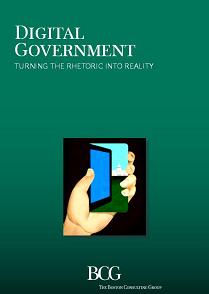Darvas, Z. & Pia Hüttl, P. (2014) “Despite lower yields, euro-periphery is not yet out of the woods – while the public debt ratio is expected to fall, the debt trajectory remains highly vulnerable to negative growth, primary balance and interest rate shocks“, Working Paper – European Macroeconomics, Bruegel Association, 18 Ιουνίου. Following Ireland, Portugal has also exited its financial assistance programme in a clean way, namely without any …Read More
Why DSGEs crash during crises
Hendry, F. D., Mizon, E. G. (2014) “Why DSGEs crash during crises“, VoxEU Organisation, 18 June. Many central banks rely on dynamic stochastic general equilibrium models – known as DSGEs to cognoscenti. This column – which is more technical than most Vox columns – argues that the models’ mathematical basis fails when crises shift the underlying distributions of shocks. Specifically, the linchpin ‘law of iterated expectations’ fails, so economic …Read More
Digital Government: Turning the Rhetoric into Reality
Carrasco, M. & Goss, P. (2014) “Digital Government: Turning the Rhetoric into Reality“, Boston Consulting Group (BCG), June. Getting better—but still plenty of room for improvement: that’s the current assessment by everyday users of their governments’ efforts to deliver online services. The public sector has made good progress, but most countries are not moving nearly as quickly as users would like. Many governments have made bold commitments, and a …Read More
The Euro Area Crisis: Politics Over Economics
Orphanides, A. (2014) “The Euro Area Crisis: Politics Over Economics“, MIT Sloan Research Paper No. 5091-14, 10 June. This paper explores the dominant role of politics in decisions made by euro area governments during the crisis. Decisions that appear to have been driven by local political considerations to the detriment of the euro area as a whole are discussed. The domination of politics over economics has led to crisis …Read More
The ill-advised rigidity of the 2% inflation target
Stegeman, H. (2014) “The ill-advised rigidity of the 2% inflation target“, Pieria Network, 16 June. Our macroeconomic policy is largely based on the theory mainly developed in the post-war years, and more particularly at the time of the Great Moderation. This was the period of steady, reasonably predictable economic growth from the beginning of the 1980s until the crisis of 2007/2008 and the subsequent Great Recession. As a result …Read More
Why does inequality grow? Can we do something about it?
Teulings, C. (2014) “Why does inequality grow? Can we do something about it?“, VoxEU Organisation, 15 June. The income inequality has increased worldwide in recent years. This column discusses the role of technological progress, globalisation, and the liberalisation of labour-market institutions on the growing inequality. The liberalisation of labour market institutions has made labour markets more flexible and created many jobs. But beyond a certain point, the net effect …Read More
Inflation Targets Reconsidered
Krugman, P. (2014) “Inflation Targets Reconsidered“, Draft paper for ECB Sintra conference, May 2014. Over the course of the1990s many of the world’s central banks converged on an inflation target of 2 percent. Why 2 percent, rather than 1 or 3? The target wasn’t arrived at via a particularly scientific process, but for a time 2 percent seemed to make both economic and political sense. On one side, it …Read More
The social impact of fiscal policy responses to crises
Vegh, C. A. & Vultein, G. (2014) “The social impact of fiscal policy responses to crises“, VoxEU Organisation, 12 June. The question of whether fiscal policy should be pro- or countercyclical has become increasingly relevant during the recession. This column provides causal evidence from South American countries showing the success of countercyclical policy in improving social indicators of economic success, combined with correlative evidence from Europe. This represents a …Read More
The European Parliament elections show the increasingly fragmented nature of European party systems
Mudde, C. (2014) “The European Parliament elections show the increasingly fragmented nature of European party systems“, LSE EUROPP, 12 June. Most coverage of the European Parliament elections has noted the rise of several far-right and Eurosceptic parties across Europe. Cas Mudde argues, however, that a more important trend was toward increasingly fragmented party systems. Presenting a series of numbers from the elections, he illustrates that ‘big parties’ are experiencing …Read More
Mending A Dysfunctional European Union
Zielonka, J. (2014) “Mending A Dysfunctional European Union“, Social Europe Journal, 11 June. The EU is not an end in itself. Europe needs a vision of functional integration orchestrated and managed not just by states, but also major regions, cities, NGOs and firms. Elections create winners and losers; the former suffer from hangover due to the excess of champagne; the latter suffer from hangover caused by depression. These last …Read More





